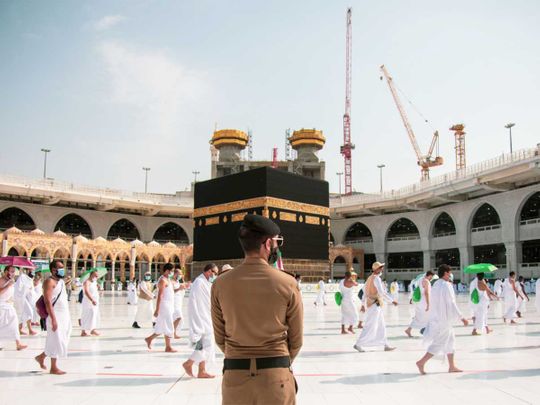
Cairo: For Muslims, 2020 will be remembered as the year when the annual Haj pilgrimage was downsized due to the global coronavirus epidemic.
In June, Saudi Arabia announced that the Haj would be held with a very limited number, confined to Saudis and non-Saudis of all nationalities who were already residing in the kingdom.
Seventy per cent of the selected pilgrims were expatriate residents while the remaining 30 per cent were Saudi citizens. The expatriates, who applied to attend the Haj rituals had to meet certain health conditions to be eligible pilgrims. They had to be free of chronic diseases, and provide a negative coronavirus-detecting PCR test result. Moreover, the applicants should not have previously performed the Haj, be aged between 20 to 50 years, and signed a written consent to undergo quarantine before and after performing the Haj.
The 30 per cent others were Saudi health practitioners and security men, who had recovered from COVID-19. They were picked in recognition of their role during the battle against the virus, provided they meet the health criteria set for other pilgrims.
The Haj, one of Islam’s five pillars, was thus drastically curtailed to a few thousands. More than 2 million Muslims usually perform the Haj. Muslims are expected to perform it at least once in their lives if they can afford it and are physically able.
This year’s Haj started on July 29 amid the toughest health measures for its rituals in memory. As part of the health precautions, each pilgrim was given a bag containing a protective face mask, a shaving instrument, personal care tools, sterilised ritual stones, a toothpick, an umbrella and a prayer rug. The pilgrims had to observe distancing and using the sterilised pebbles in performing a symbolic devil- stoning ritual.
Saudi authorities later announced that no infectious case, including the coronavirus, had been detected among the pilgrims.
Temporary Umrah halt
Concerns over the spread of the virus also prompted Saudi authorities to suspend the Umrah journeys made annually by millions of Muslims around the world, who mostly could not afford the Haj costs.
In October, Saudi Arabia set into motion a plan for gradual resumption of the Umrah or minor pilgrimage after suspension of around seven months. Likewise, stringent health rules were set for performing the Umrah.
The first phase of the plan, which began on October 4, allowed 6,000 Umrah pilgrims from inside the kingdom per day into the Grand Mosque in Mecca.
The second went into effect on October 18, allowing about 40,000 worshippers and 10,000 pilgrims a day into the Grand Mosque. As many as 20,000 Umrah pilgrims and 60,000 worshipers per day are allowed to perform prayers at the mosque, according to the current third phase that started on November 1.
Mosque shutdowns
In March, many Muslim countries closed mosques to limit the spread of virus, a step that prompted the faithful to worship at home. The mosque shutdowns encompassed the holy Islamic month of Ramadan noted for intense worshipping and congregational prayers. Saudi Arabia, the birthplace of Islam, suspended group prayers nationwide including the Grand Mosque in Mecca and the Prophet’s Mosque in Medina.
Islamic authorities in different countries urged Muslims to observe home worshipping, saying that the closure of mosques complied with the Sharia. “This decision comes to emphasize the supreme objectives of the Islamic Sharia that stresses the importance of protecting human life from all evils,” Dar Al Iftaa, Egypt’s top Islamic authority, said in a statement.
Nearly three months later, mosques started reopening as virus infections showed a downward trend in most Arab countries. However, worshippers yearning for group prayers in mosques were required to abide by health precautions, including wearing face masks, keeping apart with a distance of two metres, using personal prayer rugs and performing the ritual ablution at home. In Saudi Arabia, worshippers have their temperatures checked before they are allowed into the mosques.
Rejoicing over mosque reopening
Despite the restrictions, worshippers were jubilant about attending mosque prayers.
“Return of prayers to mosques is a day of Eid[feast],” Shaikh Adel Al Kalbani, a mosque imam in Riyadh told Saudi television Al Ekhbariya in June.
Shaikh Adel has been serving as an imam for 38 years.
“In the past, a mosque could be temporarily closed due to renovation or restoration works. At the time, one could go to another mosque. But to unable to go to all mosques, including the Two Holy Mosques , this was really a tough experience that I haven’t seen before in my life,” he added.







